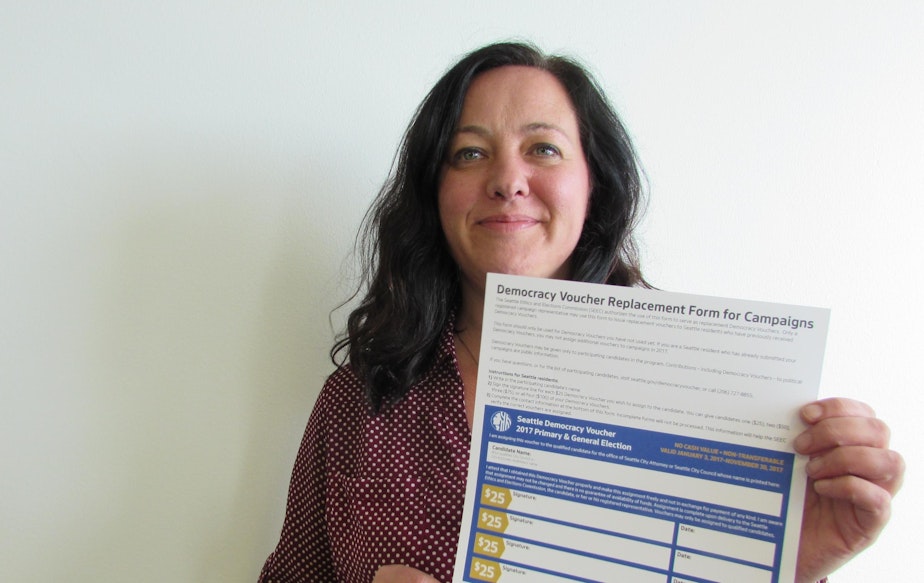‘Coupons’ add up: Democracy vouchers mean more political donors in Seattle

Through campaign events and door-to-door canvassing, Seattle political candidates are stepping up their search for so-called “Democracy Vouchers.” So far, the vouchers have translated into more than $200,000 in campaign contributions for qualifying candidates.
Each Seattle voter or legal permanent resident is eligible for four $25 vouchers, so they can contribute up to $100 total to candidates for specific city offices. The vouchers went in the mail in January.
Seattle voters approved the voucher program two years ago. It’s funded through a property tax that costs the average homeowner $11.50 per year. The goal is to give residents and candidates more incentives to connect. And city officials say it seems to be working.
René LeBeau coordinates the Democracy Voucher program at the Seattle Ethics and Elections Commission. She said people can return the vouchers in the mail, electronically or by handing them over to campaigns. At first, she said, more people were returning their vouchers by mail. But now more are being gathered and submitted by campaigns, which she takes as a positive sign.
“If the campaign’s bringing in that voucher, they probably had a conversation,” LeBeau said. “So it represents $25 to them, but to us, we know that there was a contact. And that’s the point of the program.”
Sponsored
Thirteen candidates for City Council and city attorney are participating in the voucher program in this election year. And the number of financial contributors to these races has already surpassed 2015.
The SEEC reports 5,276 contributors to date, including 4,343 using vouchers.
The total number of contributors to these races in all of 2015 was 4,570, the agency said.
Those donations are tracked and made public, like other campaign donations. One of those donors is Anita Yandle. She’s 25 and she sent her Democracy Vouchers to City Council candidate Teresa Mosqueda.
Yandle said housing and rent hikes are top issues for her in city political races this year, and she sees the vouchers as a great way to get younger people involved as candidates as well as donors. She said there were promising young women running for city council in 2015 who didn’t make it past the primary.
Sponsored
”But with Democracy Vouchers, it makes it easier for folks who don’t have the established donor base that older candidates may have to run for city council,” she said.
And vouchers give candidates more reasons to seek out new supporters.
“Candidates are starting to host ‘bring-your-voucher’ parties,” Yandle said. “So that folks who otherwise wouldn’t be able to donate or couldn’t -- like college students who are still trying to pay for their ramen -- they can still come and contribute to a candidate that they care about.”
City Council candidate Jon Grant has spoken at dozens of those house parties. “It’s a pretty reasonable ‘ask,’” he said: “Come and just show up with these -- what are essentially coupons -- and support a political candidate to create change in the community.”
Grant is making a second run for one of the at-large seats on the Seattle City Council. Vouchers account for 90 percent of his donations, or $129,000 so far. And he has more than four times the number of contributors compared to his last run.
Sponsored
“I got maybe 500 total donors when I ran the first time around in 2015,” he said. “We have almost 2,300 donors to the campaign now.”
Candidates who accept vouchers also agree to campaign spending limits. This year only candidates running for at-large city council seats and city attorney are eligible to seek the vouchers, and not all candidates are participating. The mayoral race is not part of the voucher program, but it will be in 2021.

